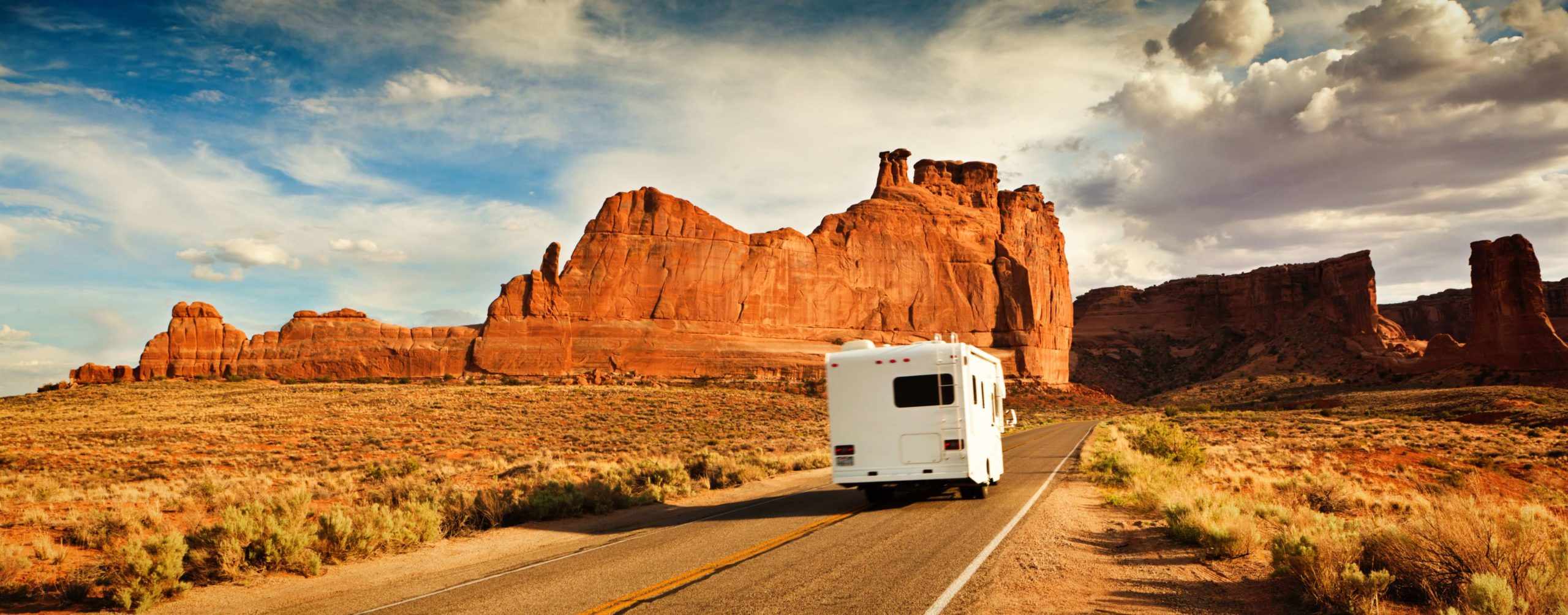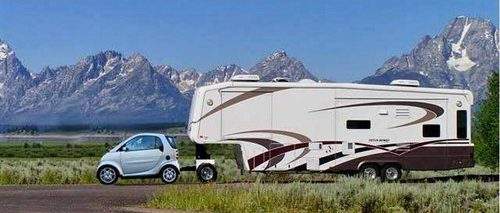“Fifth-wheel” can allude to something other than your single friend who keeps tagging along on your double dates. In the world of campers, it refers to a type of RV that gives you the same benefits of a larger model without being a full-blown house on wheels. If you’re thinking of going in this direction— and have the right towing vehicle— a fifth wheel might be the perfect fit.
Try Before You Buy: Fifth-Wheel RVs For Rent Near You
If you’re curious how the fifth wheel got its name and what makes them such a great RV option, continue reading! We’ve got answers to your questions and a few reasons why you should consider renting a fifth-wheel for your next great RV road trip.

What is a fifth wheel RV?
As it turns out, a fifth wheel does involve another wheel, but maybe not in the kind that you’re thinking.
Simply put, a fifth wheel is a hitch that allows the driver to connect a cargo attachment to the back of a large vehicle, like a tractor or truck. If you’ve seen a transport on the highway, then that’s a prime example of the fifth wheel design. Today, the fifth wheel refers to the “U” shaped coupling component found on the back of the towing vehicle, be it a large transport, pickup truck, or semi-truck.

The fifth wheel got its name from its original design. They were initially invented for horse-drawn carriages in the mid-1850s. Manufacturers (who at the time built the components by hand) placed a horizontal wheel on the cargo frame or “truck” that allowed the front axle to pivot on its own. This worked wonders for stability and maneuverability.

In the early 1900s, a version was created for motor vehicles and the name itself simply carried forward.

Why Choose a Fifth-Wheel RV?
Fifth-wheel RVs offer several advantages over traditional travel trailers. Due to their hitch design, they are easier to tow and offer more living space. The raised forward section usually houses a bedroom or living area, maximizing square footage. Many fifth wheels also come with luxurious amenities like large kitchens, multiple slide-outs, and spacious bathrooms, making them ideal for extended trips or full-time living.
Is a fifth wheel right for you?
Ultimately, the answer to this question depends on your comfort level, personal needs, and budget. There’s a great video by RV Inspection and Care that outlines some of the pros and cons of fifth-wheels and differences between travel trailers.
If you’re still on the fence, consider the following:
1. The fifth wheel hitches are handy
Fifth-wheel hitches are handy because they facilitate turning, allowing you to drive normally with the attachment automatically following suit. The hitch, therefore, eliminates the cumbersome maneuvering that you’ll experience with a bumper pull. This is a tremendous advantage if you’re not extremely comfortable towing or if you plan on driving in parks that are a little more difficult to navigate.

2. Fifth wheels have a better safety record
The fifth wheel mechanism is sturdier and safer, regardless of travel speed. The high hitch point reduces trailer sway, a towing condition that is extremely dangerous. The hitch also better distributes the weight of the trailer and offers a more secure anchoring point. If you’re bringing children or other passengers, a fifth wheel can give you extra peace of mind.
3. Fifth wheels use less gas
Compared to a large Class A motorhome, a truck towing a fifth wheel uses much less gas. Obviously, your vehicle will work harder and therefore go through fuel faster, but not nearly at the same rate as a diesel-powered motorhome. It’s better for the environment and your wallet!
If you’re already the outdoorsy type— or happen to own a heavy-duty vehicle like a pickup truck — then you’re pretty much set to go. All you need to do is either buy or rent the “U” shaped attachment along with the trailer. If you don’t own a pick-up, you can always rent a large truck and a fifth-wheel compatible trailer separately. Many prefer this route compared to renting a motorhome that’ll come with much larger gas costs.
4. Larger groups can fit in a fifth wheel
These RVs are great for large groups. Despite the fact that they give up a small amount of space to accommodate the hitch, these RVs can still be quite large, ranging between 20 and 40 feet. This allows you to accommodate up to ten people— perfect for newbie and veteran families alike. All you need is the right attachment and enough horsepower to pull the RV.

5. Fifth wheels are also great for solo campers
This type of trailer is equally great for solo travelers or sportspeople. Smaller models have plenty of space for storing equipment and other supplies and aren’t too hard for one person to operate and maintain.
Fifth-Wheel RV Towing Tips
When towing a fifth-wheel RV, ensuring you have the right truck with the towing capacity to handle the weight is essential. Always check your vehicle’s tow rating and install a proper fifth-wheel hitch for safety. Be mindful of the height and weight of your fifth-wheel RV, especially when navigating tight turns or low-clearance areas.
Give It a Try
Of course, the only real way to see if this RV is right for you is if you try one out firsthand! Rent a fifth wheel from Outdoorsy and see how you like the towing, size, and amenities.
FAQs on Fifth-Wheel RVs
Here are answers to the most commonly asked questions about fifth-wheel RVs:
Why is it called a fifth-wheel RV?
It’s named after the special “fifth wheel” hitch mechanism that attaches the trailer to the truck. The hitch, located in the bed of the truck, provides better stability compared to traditional rear-mounted hitches.
What is the advantage of a fifth-wheel hitch?
The fifth-wheel hitch is mounted over the truck’s rear axle, offering more control, better weight distribution, and less sway compared to a bumper-pull trailer, making it easier and safer to tow.
What kind of truck do I need to tow a fifth-wheel RV?
You need a heavy-duty truck with a sufficient towing capacity, usually a ¾-ton or 1-ton truck, depending on the weight of your fifth-wheel RV.
Can you live full-time in a fifth-wheel RV?
Yes, many people choose to live full-time in a fifth-wheel RV because of its spacious layout and home-like features, such as large kitchens, bathrooms, and multiple sleeping areas.
How do I know if my truck can tow a fifth-wheel?
Check your truck’s towing capacity in the owner’s manual. The weight of the fifth-wheel RV, including cargo, should not exceed the truck’s maximum tow rating.








